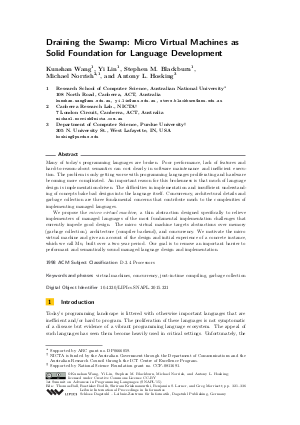Draining the Swamp: Micro Virtual Machines as Solid Foundation for Language Development
Authors Kunshan Wang, Yi Lin, Stephen M. Blackburn, Michael Norrish, Antony L. Hosking
-
Part of:
Volume:
1st Summit on Advances in Programming Languages (SNAPL 2015)
Part of: Series: Leibniz International Proceedings in Informatics (LIPIcs)
Part of: Conference: Summit on Advances in Programming Languages (SNAPL) - License:
 Creative Commons Attribution 3.0 Unported license
Creative Commons Attribution 3.0 Unported license
- Publication Date: 2015-04-30
File

PDF
LIPIcs.SNAPL.2015.321.pdf
- Filesize: 488 kB
- 16 pages
Document Identifiers
Subject Classification
Keywords
- virtual machines
- concurrency
- just-in-time compiling
- garbage collection
Metrics
- Access Statistics
-
Total Accesses (updated on a weekly basis)
0PDF Downloads0Metadata Views
Abstract
Many of today's programming languages are broken. Poor performance, lack of features and hard-to-reason-about semantics can cost dearly in software maintenance and inefficient execution. The problem is only getting worse with programming languages proliferating and hardware becoming more complicated. An important reason for this brokenness is that much of language design is implementation-driven. The difficulties in implementation and insufficient understanding of concepts bake bad designs into the language itself. Concurrency, architectural details and garbage collection are three fundamental concerns that contribute much to the complexities of implementing managed languages. We propose the micro virtual machine, a thin abstraction designed specifically to relieve implementers of managed languages of the most fundamental implementation challenges that currently impede good design. The micro virtual machine targets abstractions over memory (garbage collection), architecture (compiler backend), and concurrency. We motivate the micro virtual machine and give an account of the design and initial experience of a concrete instance, which we call Mu, built over a two year period. Our goal is to remove an important barrier to performant and semantically sound managed language design and implementation.
Cite As Get BibTex
Kunshan Wang, Yi Lin, Stephen M. Blackburn, Michael Norrish, and Antony L. Hosking. Draining the Swamp: Micro Virtual Machines as Solid Foundation for Language Development. In 1st Summit on Advances in Programming Languages (SNAPL 2015). Leibniz International Proceedings in Informatics (LIPIcs), Volume 32, pp. 321-336, Schloss Dagstuhl – Leibniz-Zentrum für Informatik (2015)
https://doi.org/10.4230/LIPIcs.SNAPL.2015.321
BibTex
@InProceedings{wang_et_al:LIPIcs.SNAPL.2015.321,
author = {Wang, Kunshan and Lin, Yi and Blackburn, Stephen M. and Norrish, Michael and Hosking, Antony L.},
title = {{Draining the Swamp: Micro Virtual Machines as Solid Foundation for Language Development}},
booktitle = {1st Summit on Advances in Programming Languages (SNAPL 2015)},
pages = {321--336},
series = {Leibniz International Proceedings in Informatics (LIPIcs)},
ISBN = {978-3-939897-80-4},
ISSN = {1868-8969},
year = {2015},
volume = {32},
editor = {Ball, Thomas and Bodík, Rastislav and Krishnamurthi, Shriram and Lerner, Benjamin S. and Morriset, Greg},
publisher = {Schloss Dagstuhl -- Leibniz-Zentrum f{\"u}r Informatik},
address = {Dagstuhl, Germany},
URL = {https://drops.dagstuhl.de/entities/document/10.4230/LIPIcs.SNAPL.2015.321},
URN = {urn:nbn:de:0030-drops-50341},
doi = {10.4230/LIPIcs.SNAPL.2015.321},
annote = {Keywords: virtual machines, concurrency, just-in-time compiling, garbage collection}
}
